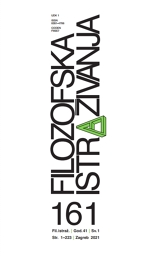Nesloboda slobode
Unfreedom of Freedom
Author(s): Martina VolarevićSubject(s): Social Philosophy, Philosophy of Mind, Sociobiology, Ontology
Published by: Hrvatsko Filozofsko Društvo
Keywords: Arnold Gehlen; Sigmund Freud; sublimation; relief;
Summary/Abstract: The paper aims to examine the extent of individual freedom of human being in relation to their instinctual bodily attachment. The starting point of examination is Gehlen’s biological anthropology which pointed to human freedom of instinctual pressures. Human freedom proves to be an opportunity to build one’s world through action. Freedom of action burdens human beings with constant decision-making. The automatism of habit, which provides solid patterns of unconscious behaviours, allows relief from freedom of action. By their upbringing, social institutions additionally automate and thus stabilise individuals’ actions. In their world produced from freedom, human beings generate a second-degree, self-produced non-freedom. Freud points to the oppressive character of culture and civilisation, which requires the individual to sacrifice instinctual gratification for the sake of cultural prosperity. As instinctual repression grows with the development of culture, the modern human being becomes neurotic because they cannot tolerate the degree of renunciation that culture demands of them.
Journal: Filozofska istraživanja
- Issue Year: 41/2021
- Issue No: 01/161
- Page Range: 19-34
- Page Count: 16
- Language: Croatian

